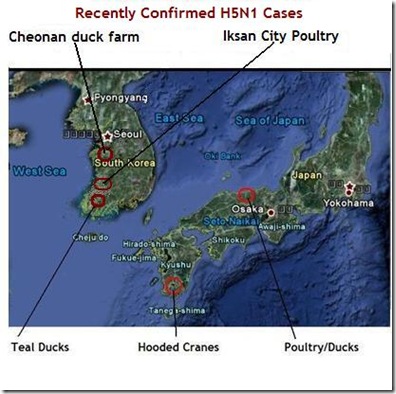# 5194
In a story we’ve been following for several days, last night officials announced that two poultry farms located in different parts of South Korea have tested positive for the highly pathogenic H5N1 bird flu virus.
Culling is reportedly complete at a duck farm in Cheonan and a poultry farm in Iksan City. Both farms remain under quarantine, and movements of vehicles and people are restricted.
In recent weeks there have been more than a half dozen bird flu reports out of South Korea and Japan, involving 3 farms (2 in Korea, 1 in Japan) and a number of wild and/or migratory birds.
Both countries have been reported free of the H5N1 virus since 2008. A few recent reports include:
Korea: 2nd Farm Investigated For Bird Flu
South Korea Investigating Cheonan Duck Farm
South Korea Finds 2 H5N1 Infected Owls
Although a number of media sources are now carrying the story of the confirmation, this one (hat tip Shiloh on FluTrackers) comes from Yonhap News.
2010/12/31 10:44 KST
S. Korea confirms bird flu outbreak at 2 poultry farms
SEOUL, Dec. 31 (Yonhap) -- South Korea on Friday confirmed its first bird flu outbreak in two years at two poultry farms in the central and southwestern part of the country.
The outbreaks at the farms in Cheonan and Iksan, 90 and 230 kilometers south of Seoul, respectively, were first detected on Wednesday after birds started to die off.
Both farms have been placed under quarantine with authorities moving to cull and bury their ducks and chickens to prevent further spreading of the disease.
During their last H5N1 outbreak in April-May 2008, South Korea waged a month-long, very expensive battle to contain the virus that resulted in the culling of more than 8 million birds.
Since then, South Korea has conducted year-round monitoring for the bird flu virus (see South Korea To Begin Year-Round Bird Flu Monitoring) in hopes of preventing future outbreaks.
In the wake of these latest discoveries, health officials are stepping up inspections, and poultry operations are being urged to increase biosecurity measures.
